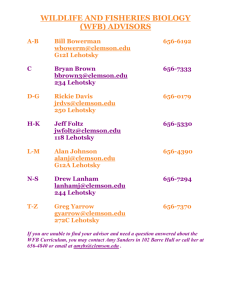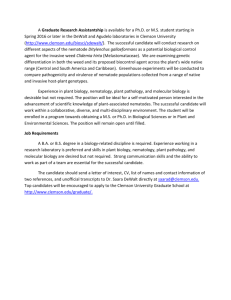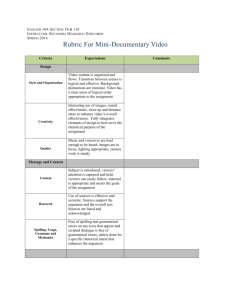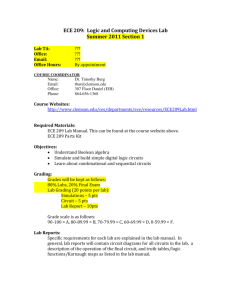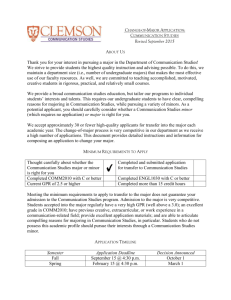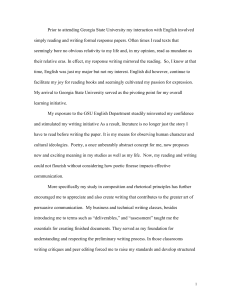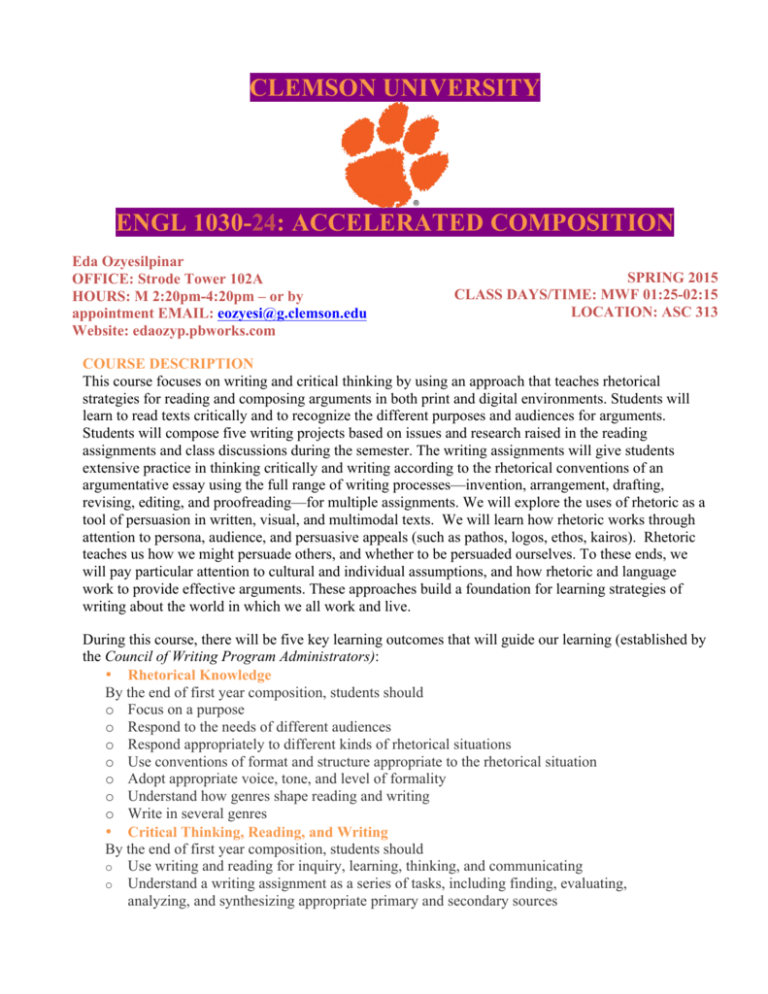
CLEMSON UNIVERSITY
ENGL 1030-24: ACCELERATED COMPOSITION
Eda Ozyesilpinar
OFFICE: Strode Tower 102A
HOURS: M 2:20pm-4:20pm – or by
appointment EMAIL: eozyesi@g.clemson.edu
Website: edaozyp.pbworks.com
SPRING 2015
CLASS DAYS/TIME: MWF 01:25-02:15
LOCATION: ASC 313
COURSE DESCRIPTION
This course focuses on writing and critical thinking by using an approach that teaches rhetorical
strategies for reading and composing arguments in both print and digital environments. Students will
learn to read texts critically and to recognize the different purposes and audiences for arguments.
Students will compose five writing projects based on issues and research raised in the reading
assignments and class discussions during the semester. The writing assignments will give students
extensive practice in thinking critically and writing according to the rhetorical conventions of an
argumentative essay using the full range of writing processes—invention, arrangement, drafting,
revising, editing, and proofreading—for multiple assignments. We will explore the uses of rhetoric as a
tool of persuasion in written, visual, and multimodal texts. We will learn how rhetoric works through
attention to persona, audience, and persuasive appeals (such as pathos, logos, ethos, kairos). Rhetoric
teaches us how we might persuade others, and whether to be persuaded ourselves. To these ends, we
will pay particular attention to cultural and individual assumptions, and how rhetoric and language
work to provide effective arguments. These approaches build a foundation for learning strategies of
writing about the world in which we all work and live.
During this course, there will be five key learning outcomes that will guide our learning (established by
the Council of Writing Program Administrators):
• Rhetorical Knowledge
By the end of first year composition, students should
o Focus on a purpose
o Respond to the needs of different audiences
o Respond appropriately to different kinds of rhetorical situations
o Use conventions of format and structure appropriate to the rhetorical situation
o Adopt appropriate voice, tone, and level of formality
o Understand how genres shape reading and writing
o Write in several genres
• Critical Thinking, Reading, and Writing
By the end of first year composition, students should
o Use writing and reading for inquiry, learning, thinking, and communicating
o Understand a writing assignment as a series of tasks, including finding, evaluating,
analyzing, and synthesizing appropriate primary and secondary sources
Integrate their own ideas with those of others
Understand the relationships among language, knowledge, and power
• Processes of Composing
By the end of first year composition, students should
o Be aware that it usually takes multiple drafts to create and complete a successful text
o Develop flexible strategies for generating, revising, editing, and proof-reading
o Understand writing as an open process that permits writers to use later invention and rethinking to revise their work
o Understand the collaborative and social aspects of writing processes
o Learn to critique their own and others' works
o Learn to balance the advantages of relying on others with the responsibility of doing their
part
o Use a variety of technologies to address a range of audiences
• Knowledge of Conventions
By the end of first year composition, students should
o Learn common formats for different kinds of texts
o Develop knowledge of genre conventions ranging from structure and paragraphing to tone
and mechanics
o Practice appropriate means of documenting their work
o Control such surface features as syntax, grammar, punctuation, and spelling.
• Composing in Electronic Environments
By the end of first-year composition, students should:
o Use electronic environments for drafting, reviewing, revising, editing, and sharing texts
o Locate, evaluate, organize, and use research material collected from electronic sources,
including scholarly library databases; other official databases (e.g., federal government
databases); and informal electronic networks and internet sources
o Understand and exploit the differences in the rhetorical strategies and in the affordances
available for both print and electronic composing processes and texts
REQUIRED TEXTS AND SUPPLIES
Everyone’s an Author. By Andrea Lunsford et al. Norton, 2013 (print or e-text version)
o
o
The DK Handbook. By Anne Frances Wysocki and Dennis A. Lynch. 3rd ed. Pearson Longman, 2013
(print or e-text version). Laptop computer as per classroom teacher’s instructions
Access to the instructor’s website (wikipage: edaozyp.pbworks.com) to follow the daily class plans,
homework assignments, and updates and changes in the schedule and assignments.
Access to Blackboard to submit Homework Assignments, Major Assignment, Assigned Readings, and
to follow grade updates and announcements.
Access to Clemson email address: Your instructor will be contacting you via your Clemson email. Use
your Clemson email to contact your instructor.
2
GRADE DISTRUBITION & GRADING PROCEDURES
You have the opportunity to earn 1000 points over the course of the semester.
A (899.5-1000), B (799.5-899.4), C (699.5-799.4), D (599.5-699.4), F (599.4 and below).
Assignment
Attendance
Participation
Blog entries (5 in total)
Facebook Posts
Is Everyone an Author?
Collaborative Writing
Composing in the Real World
The Researched Argument
Arguing in Multimedia
Total
Date Due
Daily
Daily
Points Possible
50 points
100 points
Will be given 100 points
Weekly
50 points
Jan. 30
100 points
Feb. 16
100 points
Mar. 02
100 points
200 points
Mar. 30
200 points
Apr. 17-22
1000 points
Attendance: 50 points (5% of Final Grade)
It is essential for you not to miss any of our class meetings to complete all the course work
properly. However, I understand the fact that you may have an emergency situation (personal
problem, family problem, health problem, etc.) which is why you are allowed up to THREE (3)
absences (excused or unexcused) without penalty. This does not mean that it is “okay” to miss our
class meetings; it means that you need to keep these 3 chances for any kind of emergency that
might happen in the future. If you reach the limit of absences by the drop date, I may drop you
from the class for excessive absences. I also reserve the right to drop any of you who have
missed half or more of the total number of classes before the last day to drop a class or
withdraw from the University without final grades. I will determine what to do in case of
extended illness or personal crisis on a case-by-case basis. However, excessive absences are an
adequate reason for being failed in first-year composition, even if you have turned in all the
required papers on time. If you use all of your excused absences, you will not receive
unexcused absences above and beyond those excused absences. For example, if you miss ONE
(1) class for athletics, you will have two additional absences to use at your discretion. Also
note that an excused absence only earns you the right to make up missed course work. An
excused absence does not grant additional absences.
Arriving late to class or leaving early is unprofessional and will be factored into the attendance
policy. Each recorded instance will count as ONE (1) Tardy. Three tardies equal one absence.
Any student will be marked absent if you arrive more than 10 minutes after the start of class.
Note: After three absences, your overall grade for the course will be lowered by one letter grade
[100 points] for each additional absence (documented extended illnesses notwithstanding). These
percentages cannot be made up in any way.
Note: If I see your cell phone or the use of any electronic device for non-classroom related
purposes (e.g. Facebook, or working assignments for other classes), I reserve the right to mark you
as absent without direct notification regardless of how much time is left in the class period.
Participation: 100 points (10% of Final Grade)
3
It is crucial for you to be active participants in class for us to have a strong
discussion/conversation over the subjects we are covering. Your participation grade involves
speaking up during our discussion times, reading quizzes, showing up prepared for class and
teacher conferences, and so on. In other words, participation is measurable and represents your
commitment to this course. I will provide Participation Reports to you once a month (last week of
each month) to keep you updated on where you stand in class in terms of your participation. The
grade you will receive in this part will be evaluated by considering your overall performance in
class throughout the semester. This decision is not going to be a PERSONAL one and it will
strictly be based upon on your OVERALL PERFROMANCE performance in class from a
PROFESSIONAL perspective.
Blog Posts: 100 points (10% of Final Grade)
Informal. Thoughtful. Critical. We will keep regular blogs of more informal writing than the
five main projects. In total, you are going to complete 5 Blog Posts [each worth 20 points]. Blog
posts are due when assigned, not in a cluster of posts at the end of the semester. These posts
encourage you to make both the process of writing and the act of critical reflection a habit. The
point is to write frequently, thoughtfully, and informally about the readings and discussions in this
class. You should write a minimum of 300 words for each of the FIVE blog posts.
Facebook Posts: 50 points (5% of Final Grade)
We will also keep weekly Facebook Posts. Each post is due at the end of the week: Sunday by
midnight. In these posts, you are expected to reflect on assigned readings for each week, the class
discussions for each week, and make connections among the readings and class discussions we will
be going over throughout the semester. You can use these posts as a chance to also make
connections to current events/debates/discussions going on around our community (Clemson
campus and city) or to even a broader spectrum (at state level, national level, or global level). You
can either post 50-100 words response as your weekly Facebook Post or you can use other multimodal tools (e.g. videos, posters, cartoons, images, visuals, etc.) that you think doing an effective
job reflecting your thoughts/ideas over the assigned readings and in-class discussions. Since you
are going to be posting your entries as Facebook Posts, you are also required to post a respond to
minimum one of your classmates’ posts. To be able to receive full credit, you need to post a
response. Use this chance to create an ongoing conversation, see and experience how authoring
works at both individual and collaborative levels. REMEMBER TO BE RESPECTFUL TO
DIFFERENT PERSPECTIVES AND POINTS OF VIEWS AT ALL TIMES as you post
responses to your classmates. ANY IMPROPER AND DISRESPECTFUL COMMENT TO
ANYONE’S RESPONSE WILL BE REMOVED BY ME IMMEDIATELY AND WILL
CAUSE YOU NOT TO RECEIVE CREDIT FOR YOUR WEEKLY ENTRY. YOU
SHOULD NOT POST ANY COMMENTS/QUESTIONS ABOUT YOUR GRADE. YOU
SHOULD NOT REQUEST GRADE INFORMATION FROM ME IN YOUR POSTS.
THESE ARE THE ISSUES YOU SHOUD DISCUSS WITH ME IN PRIVATE.
MAJOR ASSIGNMENTS
Please remember that all work must be formatted in MLA manuscript style and sources must be
cited in MLA citation style, unless otherwise noted.
Project One: Is Everyone An Author?
This assignment enables you to develop proficiency in rhetorical analysis and argument by writing an
essay that examines the idea that everyone’s an author. Find a persuasive text (which can be a
combined visual/textual piece) where someone is authoring that you would not have considered before.
How are they authoring? How is it different than what you have considered authoring before? Make
4
an argument about how the different form is, in fact, authoring, and how it is different than other
traditional forms of authoring. The aim of your argument is to support a thesis—using the tools of
persuasion—concerning how the text you analyze offers a persuasive argument. This assignment
should include two sources (the one you’re analyzing and another supporting source) in a Works Cited
page, formatted according to MLA standards, and your essay should be a minimum of 1000 words. By
completing this project, you can earn maximum 100 points.
100 points (10% of Final Grade)
Project Two: Collaborative Writing
This assignment requires you to shift from rhetorical analysis of one text and author to broader
cultural, social, or political issues and multiple modes of authoring. You will compose the essay
collaboratively with another student, which is why you and your partner should work on a unifying
topic/issue that you both are interested. Since many essays, especially scientific ones, are coauthored,
by working on a topic with a fellow student, you will explore how coauthoring works and how one
composes collaboratively. This assignment emphasizes rhetorical argument, visual design, research
skills, including library sources, interviews, and other forms of academic inquiry. You should put forth
an argument using both writing and images. Using your collaborative library/field research, write an
argument that offers a new perspective on the topic at hand. You should use 4 supporting sources,
formatted according to MLA standards, and your essay should be a minimum of 1000 words. Both
students will receive the same project grade, so it is important for each student to share the work of
research and writing equally. By completing this project, you can earn maximum100 points.
100 points (10% of Final Grade)
Project Three: Composing in the Real World
Compose a workplace-oriented piece of writing (such as a cover letter, a complaint, a project proposal,
or another short piece related to your field/major) in which you can investigate your own areas of
expertise. 1000 words. Research your own subject, find examples of the genre in which you are
writing, and keep them separate. Turn in your researched sources (minimum 4, formatted in MLA) and
examples with an intro separately.
100 points (10% of Final Grade)
Project Four: The Researched Argument
This assignment requires you to practice your rhetorical knowledge and develop an extended
researched argument using multimodal composition strategies. In this assignment, you will start
answering your question by structuring your own argument. It is essential for you to decide where you
stand in the overall conversation surrounding your topic (joining the conversation) to present a strong,
clear, and persuasive argument for your audience. Keep in mind that you are writing an argument to a
general and diverse audience; so in order to be persuasive and effective it is necessary to support your
claims with evidence from a variety of sources. Remember to incorporate possible objections to your
argument, rebuttals to those objections, with a goal of helping to mediate opposing sides of an issue
(rather than offering mere opinions, present multiple perspectives to show why yours make sense). The
goal is not to achieve consensus, but to put forth a well-reasoned and well-supported argument that
helps your audience move toward understanding, rather than conflict. Your essay should be at least
2000 words and have a Works Cited of at least 10 sources (formatted using MLA guidelines).
200 points (20% of Final Grade)
Project Five: Arguing in Multimedia
5
This assignment requires you to share your extended argument using multimodal composition
strategies (visual, textual, audio, tactile). Examples of the form your multimodal argument can take
are: op-ads, photo-essay, website, remix, collage/montage, video, podcast, mp3 file(s), blog, or
other multi-media combinations. It will be important to plan, organize, and structure your argument
according to effective argumentative and design principles you are learning in this course. In this
way, you will be able to present your argument effectively via multi-modal communicational tools.
Projects will be evaluated on the overall quality of the argument, the design quality, as well as the
creativity and effort needed to produce a final product comparable to a 2000-word traditional
essay. In addition to your presentations, evaluating your peers’ presentations is going to be part of
your grade for this assignment. You are going to be given “Evaluation Sheet” by me to evaluate the
performance of your peers as they present. By completing these forms, you will earn 50
points.[NOTE: This does NOT mean your project needs to include 2000 words, but it should
represent an equal amount of work (research, designing, writing) as you did on Project Four.] 200
points (20% of Final Grade)
UNIVERSITY & COURSE POLICIES
Students with Disabilities
It is university policy to provide, on a flexible and individualized basis, reasonable accommodations to
students who have disabilities. Students are encouraged to contact Student Disability Services to
discuss their individualized needs for accommodation. For more information visit
http://www.clemson.edu/campus-life/campus-services/sds/index.html
The Clemson University Title IX (Sexual Harassment) Statement: Clemson University is
committed to a policy of equal opportunity for all persons and does not discriminate on the basis of
race, color, religion, sex, sexual orientation, gender, pregnancy, national origin, age, disability,
veteran’s status, genetic information or protected activity (e.g., opposition to prohibited discrimination
or participation in any complaint process, etc.) in employment, educational programs and activities,
admissions and financial aid. This includes a prohibition against sexual harassment and sexual
violence as mandated by Title IX of the Education Amendments of 1972. This policy is located
at http://www.clemson.edu/campus-life/campus-services/access/title-ix/. Mr. Jerry Knighton is the
Clemson University Title IX Coordinator and is also the Director of Access and Equity. His office is
located at 111 Holtzendorrf Hall, 864.656.3181 (voice) or 864.565.0899 (TDD).
In-class Conduct
In general, treat each other and the instructor with respect and follow standards of common
Courtesy. Please see Clemson University “Classroom Behavior” policy to understand what our
university expects from you: http://www.clemson.edu/campus-life/campus-services/studentconduct/classroom-behavior.html
In addition to these university rules, I also have my own expectations and “do’s” and “don’ts”:
• This course requires the use of computer technologies in and out of class. Students
are expected to bring their laptops to class with batteries fully charged. While
some class time is provided for computer literacy instruction, the instructor on an
individual basis will either provide additional help or recommend other support
for advanced applications. Please turn off all cell phones or other electronic
communication devices and place them out of sight (in a bag, purse, pocket) while
6
•
•
•
•
•
•
•
•
•
•
in class. You may think quietly texting someone is not distracting to the instructor
or fellow students, but it is.
Do not use your time in English 1030 to work on assignments for other
classes.
Computers are to be used for English 1030 work only. No shopping, no
Facebook, etc. Those who consistently violate this policy will be asked to leave.
You will also be counted absent and lose credit for any in-class work that day.
Do not talk or make excessive noise while the instructor or another student
is speaking to the class as a whole. (This includes typing on the keyboard or
clicking the mouse.)
When group work is assigned in class, you must work in a group, not as an
individual.
During group work time, please stay on task and work cooperatively with
other group members.
BE PUNCTUAL. Attendance will be recorded for each class meeting.
COME TO CLASS PREPARED. Your input is valuable. Read all assigned readings,
complete all assigned work, and come to class prepared to write and talk about the
day’s topics, readings, and writings.
BE RESPECTFUL: Treat your peers and me with respect, even if our worldviews,
values, and opinions are wildly different from yours. Please be tolerant and respectful
of others.
COMMUNICATE WITH ME. If there is something going on in your life that is
affecting your work, please let me know as soon as possible. If you do not understand
a concept or assignment, or if you are having trouble completing an assignment, please
let me know so I can work with you to help you.
MEET DEADLINES. It is your responsibility to turn in all of your assignments at
the designated time and date.
Quizzes
I may elect to give quizzes on the readings and class discussions/lectures if I feel that all students
are not completing the assigned work satisfactorily. The best way to avoid quizzes is to complete
the assignments and participate in the class discussions.
Office Hours
Please note my regular office hours above. You also can arrange to see me at other times that are mutually
convenient. Office hours belong to you just as much as our class time. Don’t hesitate to take advantage of
my availability and the help I am ready to offer. If you need to contact me outside of class time or office
hours, it is best to communicate with me by email.
Due Dates/Late Work/Extensions
I will not accept late weekly Discussion Boards or missed in-class work. These weekly and daily
assignments are directly related to your participation and attendance in class. All the major assignments
are due within the first five minutes of class on the due date, unless otherwise specified. However, if there
is a crisis that prevents you from meeting a deadline of any major project, you can request an extension granted in writing at least 24 hours before the due date- to turn the work in late without a penalty. The
approval of an extension is entirely at my discretion and will depend on the reason for your absence, your
record of completion of work, and attendance. If I realize that you miss a lot of classes, weekly entries, inclass work, and you do not turn any draft of the upcoming major project in, I will not give an extension
7
because It will be obvious that you need extra time because of your laziness. All extensions must be
confirmed by email. Due dates are already posted – please note them in your calendar and plan ahead.
Turning in a major assignment late without a valid excuse will negatively affect your grade. If a paper is
turned in after the due date, its lateness will be taken into consideration when assessing the grade. After
the due date, you lose 10 points for every day you miss to submit your project.
All work may be turned in early for evaluation and/or pre-planned absences. Periodically, the instructor
might revise the tentative course schedule; students are responsible for documenting any formally
announced changes in the schedule.
Grading Policy
Your major assignments will receive individual grades, as well as individual attention from your
classmates and me. These various assignments will be assigned a separate grade. These assignments help
to track your progress as we move through the semester. They indicate your willingness to be a part of the
course, and to collaborate with others in the class. As with any course, you will get out of it what you put
into it. Your goal is to demonstrate your development toward mastery of the five learning outcomes for
this course. These goals will be discussed throughout the course.
While each writing situation may call for some adjustment in the overall criteria based on the rhetorical
situation, the following descriptive rubric is consistent with the values of first-year composition at
Clemson and describe very general indicators that both you and your instructor may take into
consideration when assessing your work and progress in the course. While the final interpretation and
assessment of your grade remains the responsibility of your teacher, the work that earns the grade falls
entirely to you the student.
A: Represents excellent participation in all course activities (including attendance and promptness); all assigned work
completed on time, with very high quality in all work produced for the course. Evidence of significant and sustained
development across the five learning outcomes.
Responds fully to topic and thoroughly addresses issues.
Shows unusual or substantial depth and complexity of thought, including strong analysis.
Demonstrates clarity, focus, organization, and unity throughout.
Thoroughly investigates the topic; shows full development with supporting detail.
Documents ideas, information, and questions according to convention.
Demonstrates superior control of diction, shows appropriate variety of sentences, and incorporates smooth,
well-integrated transitions.
• Evidences mastery of mechanical and technical aspects of writing.
B: Represents good participation in all course activities (including attendance and promptness); all assigned work
completed on time, with consistently high quality in course work. Evidence of marked and above average development
across the five learning outcomes.
•
•
•
•
•
•
• Clearly and directly responds to topic and to issues.
• Shows depth and complexity of thought; investigates issues and addresses basic counterarguments.
• Demonstrates effective organization and adequate development.
• Incorporates a wide range of sources; uses plenty of detail to support ideas and conclusions.
• Documents sources correctly, with occasional minor errors.
• Contains only minor mechanical errors and exhibits no pattern of errors.
C: Represents average participation in all course activities; all assigned work completed, with generally good quality
overall in course work. Evidence of some development across the five learning outcomes.
•
•
•
Addresses question or topic and explores issues but draws no clear conclusion.
Shows clarity of thought and organization but fails to show sufficient complexity or depth of thought.
Uses only a few basic sources.
8
• Attempts to include adequate detail and development but may leave out obvious counterarguments.
• Attempts to document correctly.
• Demonstrates competence in mechanics; avoids major errors.
D: Represents weak and uneven participation in course activities; some gaps in assigned work completed, with
inconsistent quality in course work. Evidence of development across the five learning outcomes is partial or unclear.
Consistently strays from topic; is oblique or irrelevant.
Reflects simplistic, reductive, or stereotypical thinking; relies heavily on generalization; shows little evidence of
research.
• Shows poor or confusing organization; is too short.
• Contains garbled paraphrases; words or passages are nearly plagiarized.
• Documentation is careless, incorrect, or missing in some cases.
• Exhibits consistent flaws in language, syntax, or mechanics.
• Exhibits inadequate research or reading.
F: Represents minimal participation in course activities; serious gaps in assigned work completed, or very low
quality in course work. Evidence of development is not available.
•
•
•
•
•
•
•
Distorts topic or assignment; fails to address assignment; fails to establish topic.
Provides no development.
Contains obvious or deliberate plagiarism; lacks documentation of some or all sources.
Displays gross technical or mechanical incompetence and repetitive errors.
Exhibits inadequate research or reading.
Plagiarism and Academic Dishonesty
The following is Clemson’s official statement on “Academic Integrity”: “As members of the Clemson
University community, we have inherited Thomas Green Clemson’s vision of this institution as a 'high
seminary of learning.’ Fundamental to this vision is a mutual commitment to truthfulness, honor, and
responsibility, without which we cannot earn the trust and respect of others. Furthermore, we recognize
that academic dishonesty detracts from the value of a Clemson degree. Therefore, we shall not tolerate
lying, cheating, or stealing in any form.”
A simple definition of plagiarism—one that we will expand upon this semester—is when someone
presents another person’s words, visuals, or ideas as his/her own. The instructor will deal with plagiarism
on a case-by-case basis. The most serious offense within this category occurs when a student copies text
from the Internet or from a collective file. This type of academic dishonesty is a serious offense that will
result in a failing grade for the course as well as the filing of a formal report to the university.
See the Clemson site below for information about Academic Integrity and procedures regarding the
violation of Clemson policies on scholastic dishonesty:
http://www.clemson.edu/academics/academic-integrity/
Grade Protests
A student wishing to protest a final course grade must first try to resolve any disagreement with the
instructor. If unable to reach a resolution, the student may follow the procedures listed under
"Academic Grievance Committee." Grievances must be filed within 90 calendar days (exclusive of
summer vacation) from the date printed on the grade report.
Dropping Classwork
A subject dropped after the first two weeks of classwork and prior to the last seven weeks during the
fall and spring semesters is recorded as W-Withdrew. Proportionate time periods apply during summer
9
sessions.
The Writing Center
The Writing Center is a free tutoring service available to the entire student body, regardless of major or
academic standing. It provides students opportunities to discuss questions or problems related to
academic writing—from generating a topic and thesis to organizing a draft and integrating appropriate
citations. The Writing Center’s goal is to help Clemson students become confident and effective
writers. As an English 103 student, you should feel free to utilize the Writing Center to receive
additional help or feedback on any course assignments or projects. You can make an appointment with
a tutor by visiting the Writing Center’s website (http://www.clemson.edu/centers-institutes/writing/),
calling them at 864-656-3280, or simply stopping by.
SYLLABUS ITINERARY (subject to change)
[Assignments listed are due by the next class period unless noted otherwise. Please always follow the class
wiki page www.edaozyp.pbworks.com for the most current and updated schedule]
Notes: Jan 7: Classes Begin | Jan 13: Last day to register or add a class | Jan 21: Last day to drop or
withdraw from the University without a W (withdraw) grade
Wednesday, January 7
Friday, January 9
Monday, January 12
Wednesday, January 14
Friday, January 16
Monday, January 19
Wednesday, January 21
Friday, January 23
Monday, January 26
In Class
Discuss: Is Everyone an Author?
Discuss: What is Rhetoric? Blogging
instructions.
Homework
Discuss Chapter 1. Consider how rhetoric is
everywhere. Analyze two images together.
Discuss visual rhetoric. Discuss ethos and
write a short Academic Integrity Pledge to
turn in during class.
Discuss Chapter 2: Consider different
rhetorical situations. In class: Write a short
formal letter and revise it to make it informal.
Discuss Chapter 3: Consider different writing
processes. How do you write? Where do
you write? What helps, and what doesn't.
Practice different scenarios. Discuss Project
One
Martin Luther King Jr. Holiday
Wednesday is the last day to drop or
withdraw from the University without a W
(withdraw) grade)
Discuss models of essays.
Read Chapter 2
Discuss: What is Baron's argument? Is he
right? What is difficult about writing for
individuals and as a society?
Peer review Project One in small groups
Read "Nation Shudders at Block of Text" (881).
Bring two hardcopies of your draft for peer
review.
Finish Project One (Bring hard copy of paper to
class) | If you are linking to the image elsewhere
on the Internet, BE SURE TO NOTE EXACT
SOURCE OF IMAGE.
Read Chapter 1. Create a blog and send in the
URL. Post a little bio with a photograph of
yourself as the first post.
Read Chapter 3
Blog Post: Consider how you have composed in
the past and what you hope to learn more of in
this class.
Read Baron's "Should Everybody Write?" (705).
Work on draft of Project One
10
Wednesday, January 28
Friday, January 30
Monday, February 2
Wednesday, February 4
Friday, February 6
Monday, February 9
Wednesday, February 11
Friday, February 13
Monday, February 16
Wednesday, February 18
Friday, February 20
Monday, February 23
Wednesday, February 25
Friday, February 27
Monday, March 2
Wednesday, March 4
Project One DUE. Discuss Project Two.
Look at Chapter 4 in class. Discuss
collaborative authoring. Get into small
groups.
Mindmapping. Brainstorming. Freewriting.
In class experimentation with Google Docs,
and/or other collaborative composing
software. Discuss collaborative writing
examples like Wikipedia.
Teacher Conferences
Discuss your coauthoring process and
Bartlett and Steele's article.
Project Two DUE. Discuss Project Three.
Discuss more variations on rhetoric from
Chapter 5.
Composing in the real world.
Look at examples of real-world writing.
Discuss the real world, work, and how this
class is relevant to everything else you will
ever do.
Project Three DUE. Share what forms your
projects took. Discuss Project Four.
Discuss other kinds of rhetoric that use
multimedia as a platform.
Analyzing Print Ads and Billboards
Analyzing Websites
Analyzing Videos and Commercials
Discuss good and bad design. Plan what
needs to happen to get your project done on
time.
Look at Movie trailers in class as examples of
outlines and organizational strategies.
Compare multimedia organization principles
to the organization principles in writing
Friday, March 6
Class Field Trip to a Rhetorical Place on
Campus
Monday, March 9
Discuss how technology has changed
composition, and what you've learned so far
Discuss and experiment with texting in class.
Wednesday, March 11
Friday, March 13
More tips and examples of multimedia
authoring.
Monday, March 16
Spring Break
Explore your next topic with one of the
brainstorming techniques.
Write and prep for teacher conference.
Read Bartlett and Steele, "Monsanto's Harvest
of Fear" (683), a rare coauthored essay.
Read Chapter 5. Finish Project Two.
Read Chapter 6
Work on Project Three
Read Honoré, "Work is a Blessing." (79)
Finish Project Three
Read Pinker "Mind over Mass Media" (893)
Read Carr "Flame and Filament" (741)
Read Ebert "Why I Hate 3-D" (755)
Blog Post: Your own examples of media
arguments, both good and bad.
Blog Post: Minimovie comparing your
composing process to something else. Host it on
Youtube, and post into your blog. You can
record directly into Youtube using your webcam
at youtube.com/my_webcam
Read Leher, "We, Robots" (835)
Read Truss, "The Joy of Texting" (939)
Blog Post: Discuss the readings we have done for
the multimedia project, and what you've learned
about how media has changed argumentation.
11
Wednesday, March 18
Spring Break
Friday, March 20
Spring Break
Monday, March 23
Work on multimedia projects in class.
Consider getting feedback from other
students.
Project Four Due. Share projects by setting
up your laptops around the classroom.
Continue Showcasing. Discuss Project Five.
Discuss Chapter 7 and Argumentation
Discuss language and how arguments are
made in language.
Finish Project Four
Discuss How Good and Bad Research is
done. In groups of two or three, look for one
good article, and one bad article.
In-Class: Field Trip! Go to library to find
two sources.
Getting Organized: Work on outlines in
class.
How to Cite an article.
MLA, Following a Format.
Share First Drafts. Logical Fallacies
Adding Style
Look in your DK Handbook – cite at least 4
kinds of sources in MLA style, as you would in a
Works Cited list.
Explore Chapters 15-20
Blog Post: Explain your writing process and
what you've learned along the way.
Monday, April 20
Grammar, Conventions, and other things
you should know by now. Make some
revisions in class.
Project Five Due. Present research
Wednesday, April 22
Present research
Friday, April 24
Last Day of Class! Reflections. Course
Evaluations.
Wednesday, March 25
Friday, March 27
Monday, March 30
Wednesday, April 1
Friday, April 3
Monday, April 6
Wednesday, April 8
Friday, April 10
Monday, April 13
Wednesday, April 15
Friday, April 17
Read Chapter 7, 13 and 14
Read Crystal "2b or Not 2b? (745)
Read Staples "Why Shower Students with A's"
(935)
Explore Chapters 21, 22, 23
Read Chapter 24
Finish first draft of Project Five.
Explore Chapters 26, 27, 28
Explore Chapters 29, 30, 31
Homework: Finish the final draft of the Project
Five | Prepare presentations.
Notes: Apr. 27- May 1: Exams | May 5: (9am)
deadline to submit candidate final grades | May
6: (9am) deadline for all grades (access grades
via TigerWeb)
12

